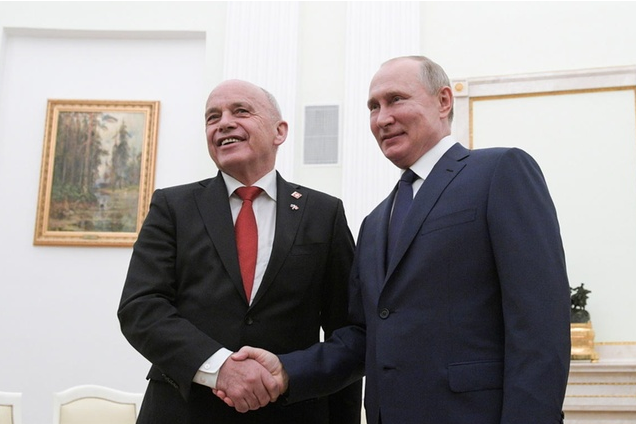Swiss President Ueli Maurer meets Russian leader Vladimir Putin, November 2019. (Keystone / Alexei Druzhinin / Sputnik / Kre) Switzerland performs a delicate dance when it comes to promoting business interests, maintaining neutrality and defending human rights. Daniel Warner looks at recent examples and the stakes at play. Doing business with other countries and promoting human rights can and do go hand in hand, Swiss State Secretary for Foreign Affairs Pascale Baeriswyl recently told swissinfo.ch. According to Baeriswyl, the future Swiss Ambassador to the UN in New York and the woman in charge of writing the country’s foreign policy strategy for the near future, “you cannot sustainably have good business and economic relations if a country is in dire domestic
Topics:
Swissinfo considers the following as important: 3.) Swiss Info, 3) Swiss Markets and News, Business, Daniel Warner, Featured, newsletter, Ueli Maurer, Vladimir Putin
This could be interesting, too:
Nachrichten Ticker - www.finanzen.ch writes Die Performance der Kryptowährungen in KW 9: Das hat sich bei Bitcoin, Ether & Co. getan
Nachrichten Ticker - www.finanzen.ch writes Wer verbirgt sich hinter der Ethereum-Technologie?
Martin Hartmann writes Eine Analyse nach den Lehren von Milton Friedman
Marc Chandler writes March 2025 Monthly

Swiss President Ueli Maurer meets Russian leader Vladimir Putin, November 2019. (Keystone / Alexei Druzhinin / Sputnik / Kre)
Switzerland performs a delicate dance when it comes to promoting business interests, maintaining neutrality and defending human rights. Daniel Warner looks at recent examples and the stakes at play.
Doing business with other countries and promoting human rights can and do go hand in hand, Swiss State Secretary for Foreign Affairs Pascale Baeriswyl recently told swissinfo.ch.
According to Baeriswyl, the future Swiss Ambassador to the UN in New York and the woman in charge of writing the country’s foreign policy strategy for the near future, “you cannot sustainably have good business and economic relations if a country is in dire domestic shape. In most cases economic relations do not contradict other foreign policy goals”.
What is the relationship between business and human rights? In a transactional world – the world as conceived by Donald Trump – the economic benefits of business far outweigh human rights concerns. At best, business cooperation can lead to better understanding and eventually to changes in human rights policies. This is the reasoning often given when businesses work in countries with poor human rights records and environmental policies.
And following such logic, Swiss President Ueli Maurer has visited Russia, China, Saudi Arabia and Kazakhstan in what has been labelled his “2019 autocrat world tour”. In response to criticism over these countries’ poor human rights records, he has said that while promoting Swiss economic interests are a priority, especially in his role as finance minister, he has also raised rights issues and adherence to international law during each visit. The neutral role of Switzerland adds strength to that argument.
New efforts, old standoffs
In Geneva, an increasing number of platforms are seeking to bring human rights and business together and go beyond the transactional relationship. The Center for Business and Human Rightsexternal link just opened at the University of Geneva. A network for sustainable financeexternal link has also been launched. These platforms are more than just philanthropy or altruism. They are part of a wave of interest in overcoming the separation of business from human rights or larger ethical issues, and part of the movement demanding more corporate social responsibility.
But the standoff between two Geneva-based international organizations shows that the relationship between business and labour policy remains a difficult one: the World Trade Organization (WTO), which aims to ensure countries abide by rules promoting fair trading practices, and the International Labour Organization (ILO), which deals with workers’ rights.
Attempts have been made to bring the two institutions together through a so-called social clause to integrate several core labour standards into trade agreements, but this has not been successful. In fact, several years ago an official at the ILO told me that one couldn’t even organize a friendly soccer game between the staffs of the two organizations.
Threading the needle
What about Switzerland? Can it thread the needle of promoting economic interests while adhering to neutrality and to its values as a defender of human rights and humanitarian law?
The role of Switzerland in the recent exchange of prisoners between the United States and the Islamic Republic of Iran is a successful reminder of the bridge-building capacity of a small country. But when the State Secretary says that “clashes between doing business and promoting human rights in the world is ‘overrated,’” is she speaking for Muslims in China like the Uighurs? Or for the murder and dismembering of the Saudi Arabian journalist Jamal Khashoggi? The list goes on.
Swiss Ambassador to Washington Jacques Pitteloud said in a recent television interview that the United States and Switzerland had a common history of shared values. One hopes that those values are deeper than merely transactional ones.
Opinion series
swissinfo.ch publishes op-ed articles by contributors writing on a wide range of topics – Swiss issues or those that impact Switzerland. The selection of articles presents a diversity of opinions designed to enrich the debate on the issues discussed. If you would like to submit an idea for an opinion piece, please e-mail [email protected]
Tags: Business,Daniel Warner,Featured,newsletter,Ueli Maurer,Vladimir Putin
